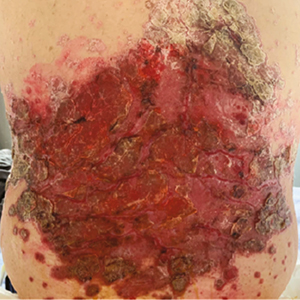Guselkumab for the treatment of severe plaque psoriasis in a schizophrenia patient

Accepted: 26 January 2022
HTML: 19
All claims expressed in this article are solely those of the authors and do not necessarily represent those of their affiliated organizations, or those of the publisher, the editors and the reviewers. Any product that may be evaluated in this article or claim that may be made by its manufacturer is not guaranteed or endorsed by the publisher.
A wide range of comorbid conditions are associated with psoriasis, many studies have drawn attention to a higher prevalence of psychiatric comorbidities in psoriatic population. Herein, we present a case of a Caucasian 44-years-old man suffering from a severe schizophrenia, who received guselkumab (a human monoclonal antibody targeting the p40 subunit of IL-23) for the treatment of a moderate-to-severe plaque type psoriasis. After 3 months, the patient reached complete resolution of psoriasis without any side effects, maintained at 6 months follow up visit. Some studies have highlighted the hypothesis that an hyperactivation of immune response appears to be one of the main mechanisms underlying the increased risk of this association. In particular, the axis il-17/il-23 plays a central role in the pathogenesis of this disease. Further research will be needed to assess whether anti-IL23 drugs could be a more suitable therapeutic option in psoriatic patients with schizophrenia.
Radi G, Campanati A, Diotallevi F et al. A. Novel Therapeutic Approaches and Targets for Treatment of Psoriasis. Curr Pharm Biotechnol. 2021 DOI: https://doi.org/10.2174/15734129MTA3hNzYc5
Adalimumab Modulates Angiogenesis in Psoriatic Skin, European Journal of Inflammation, 2013 May 1 .
Ungprasert P, Wijarnpreecha K et al.Patients with schizophrenia have a higher risk of psoriasis: A systematic review and meta-analysis. Psychiatry Res. 2018 Jan DOI: https://doi.org/10.1016/j.psychres.2017.11.021
Correll CU, Schooler NR.Negative Symptoms in Schizophrenia: A Review and Clinical Guide for Recognition, Assessment, and Treatment. Neuropsychiatr Dis Treat. 2020 Feb 21 DOI: https://doi.org/10.2147/NDT.S225643
Stilo SA, Murray RM.Non-Genetic Factors in Schizophrenia. Curr Psychiatry Rep. 2019 Sep 14 DOI: https://doi.org/10.1007/s11920-019-1091-3
Goldsmith DR, Rapaport MH et al. A meta-analysis of blood cytokine net-work alterations in psychiatric patients: comparisons between schizophrenia, bipolar disorder and depression. Mol Psychiatry. 2016 Dec DOI: https://doi.org/10.1038/mp.2016.3
Borovcanin M, Jovanovic I et al. Increase systemic levels of IL-23 as a possible constitutive marker in schizophrenia. Psychoneuroendocrinology. 2015 Jun DOI: https://doi.org/10.1016/j.psyneuen.2015.03.003
Yu S, Yu CL, Huang YC et al. Risk of developing psoriasis in patients with schizophrenia: a nationwide retrospec-tive cohort study. J Eur Acad Dermatol Venereol. 2017 Sep DOI: https://doi.org/10.1111/jdv.14303
Radhakrishnan R, Kaser M et al. The Link Between the Immune System, Environment, and Psychosis. Schizophr Bull. 2017 Jul DOI: https://doi.org/10.1093/schbul/sbx057
Yin X, Wineinger NE et al. Common susceptibility variants are shared between schizophrenia and psoriasis in the Han Chinese population. J Psychiatry Neurosci. 2016 Oct DOI: https://doi.org/10.1503/jpn.150210
Copyright (c) 2022 the Author(s)

This work is licensed under a Creative Commons Attribution-NonCommercial 4.0 International License.
PAGEPress has chosen to apply the Creative Commons Attribution NonCommercial 4.0 International License (CC BY-NC 4.0) to all manuscripts to be published.





 https://doi.org/10.4081/dr.2022.9476
https://doi.org/10.4081/dr.2022.9476



